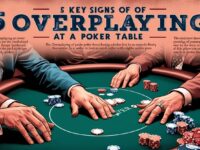In the thrilling world of poker, few moments elicit as much emotional upheaval as the infamous “bad beat.” This phrase, well-known among poker enthusiasts, represents those unexpected twists of fate when a player with a seemingly unbeatable hand loses to an even more fortuitous combination. Delving into these moments reveals not only the unpredictable nature of the game but also the psychological and strategic layers that define the poker experience. This article seeks to explore the intricacies of bad beats, from their role in the mystique of poker to the personal tales of players who have faced these devastating downfalls.
Unraveling the Mystique of Poker’s Bad Beats
In the realm of poker, a “bad beat” occurs when a player holding a strong hand is unexpectedly trumped by another player who had a lower probability of winning. Typically, this happens on the “river,” or the last community card dealt in games like Texas Hold’em, when the improbable finally trumps the probable. These moments add a layer of suspense and excitement to poker, reminding players that the game is not solely governed by skill and strategy but also by chance and luck. The heart-stopping nature of a bad beat is what keeps players both cautious and enthralled.
Bad beats play an essential role in crafting the lore and legend of poker. They are the stories recounted in hushed tones among friends at poker tables around the world, the moments that make seasoned players wary of celebrating too early. The odds-defying nature of these moments serves as a humbling reminder that no hand is invincible and that every game of poker is a dance with uncertainty. For newcomers, experiencing a bad beat can be a rite of passage, a lesson in humility, and an initiation into the nuanced reality of the game.
Beyond their role in poker folklore, bad beats also highlight the psychological aspects of the game. Players must develop resilience and emotional fortitude to handle the disappointment and frustration of losing unexpectedly. The ability to maintain composure in the face of such unpredictability often distinguishes successful players from the rest. Understanding that bad beats are an inherent part of poker helps players prepare mentally, allowing them to focus on long-term strategies rather than short-term losses.
When Luck Turns: Tales of Devastating Downfalls
The world of poker is brimming with stories of bad beats that have left indelible marks on tournaments and friendships alike. One legendary tale involves the 2003 World Series of Poker, where professional player Phil Ivey suffered a notorious bad beat at the hands of Chris Moneymaker. Holding a full house, Ivey was poised to win, only for Moneymaker to pull an improbable straight on the river. This pivotal moment not only knocked Ivey out of the tournament but also catapulted Moneymaker to victory, highlighting how a single card can alter the course of poker history.
Another famous story is that of the “Quad Aces vs. Royal Flush” bad beat, a scenario that seems almost crafted for fiction. This rare occurrence involves one player holding four aces while the opponent, against all odds, completes a royal flush. Such instances are so improbable that they become the stuff of legends, shared and reshared in poker circles as cautionary tales of the game’s unpredictable nature. These stories, while devastating for those involved, enrich the tapestry of poker narratives, reminding players of the thrilling unpredictability in every hand.
Bad beats are not confined to high-stakes games; they occur in casual settings as well, often serving as memorable experiences among friends. In home games, tales of bad beats become anecdotes that are recounted over and over, each time with a little more embellishment. These stories bind players together, creating a shared history of the ups and downs of poker life. While the immediate aftermath of a bad beat can be frustrating, the eventual retelling becomes a testament to the shared joy and agony of the game, a reminder of the human element that underpins every poker hand.
Understanding bad beats is crucial for anyone looking to navigate the intricate world of poker. These moments of unexpected loss serve as a potent reminder of the role that luck plays in the game, no matter how strong one’s hand or strategy might be. They underscore the complexity of poker, where skill must be balanced with resilience in the face of fortune’s whims. As players gather around tables worldwide, the stories of bad beats continue to be told, binding communities together and enriching the game with tales of both heartbreak and triumph. Ultimately, bad beats are a testament to the enduring allure of poker, a game where every hand holds the promise of both disaster and glory.



















0 Comments